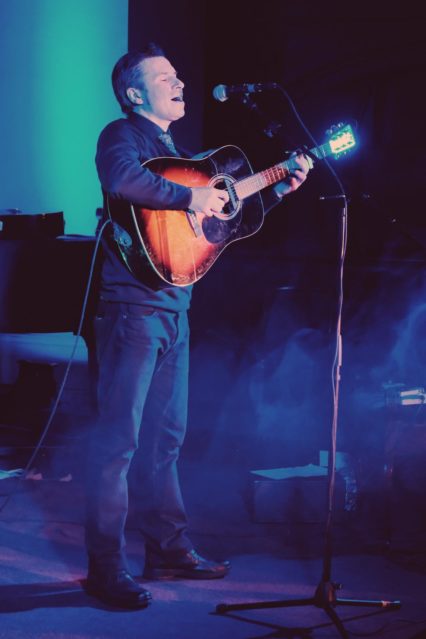Speakers’ Corner by Nick Ellis is the artist’s third album release in as many years, and was conceived in the heat of the historic, explosive Spring and Summer of 2017. The narrative captures the uncertain and anxious atmosphere of a divided, disillusioned and broken Britain, caught in the zeitgeist of a major cultural, social and political shift. In advance of his appearance at the Twm Sbaen Festival in Wrexham, Craig Austin spoke with Ellis about love, loss and the cultural renaissance of his home city of Liverpool.
When a friend is at pains to publicise the degree to which Liverpool is currently happening, and full of happenings – ‘there’s something in the air, you can sense it’– it would not be unreasonable to imagine such tidings being delivered in an accent steeped in the red-brick streets of Aigburth, Toxteth or Wavertree. The city of Liverpool is world-renowned for a multitude of righteous reasons, but being shy about its giddy civic delights is certainly not one of them.
The very fact that such news is being delivered in an accent from 30 miles down the East Lancs Road, by – whisper it – a Manc no less, is probably the point at which to sit up and take notice. Having recently performed at the city’s La Violette Società, a socially conscious contemporary cabaret of music, poetry and urban magic run by the people behind Violette Records, that same friend emerged from the cultural fray with a heady sense of a city that appears to be brimming with the possibility of this latest cycle of its unique artistic output.
One of the most celebrated heads within this jumbled collage of local talent will soon be crossing the Dee Estuary to perform at Wrexham’s Twm Sbaen Festival, a cultural event to celebrate the life of a Welsh miner who was jailed for his part in the Spanish Civil War – a man who made his way to Spain to fight fascism after telling his family he was going to Colwyn Bay for the weekend.
 Nick Ellis, whose 2018 release Speakers’ Corner was named as one of Wales Arts Review’s albums of the year, blends streetscape narrative-noir with a classic British acoustic approach. Using a blend of rhythmic attack and finger-quick lucidity, his sound has been described as ‘a conversation between Elvis Costello and John Martyn’. Though I prefer the instinctively pithy review delivered by a bewitched punter at a recent North London show I attended: ‘he’s got the fucking chops, ‘im’.
Nick Ellis, whose 2018 release Speakers’ Corner was named as one of Wales Arts Review’s albums of the year, blends streetscape narrative-noir with a classic British acoustic approach. Using a blend of rhythmic attack and finger-quick lucidity, his sound has been described as ‘a conversation between Elvis Costello and John Martyn’. Though I prefer the instinctively pithy review delivered by a bewitched punter at a recent North London show I attended: ‘he’s got the fucking chops, ‘im’.
‘There’s definitely something going on’, Ellis agrees about his city’s stirring cultural scene. ‘People have started to get off their arses and be proactive again. And that’s great, but unfortunately we don’t seem to have the kind of infrastructure that somewhere like Manchester has, something that’s direct, especially now with so much of the BBC being based there. What we’re lucky to have is a truly grass roots movement. People are starting to write again, make albums again, and those albums are now getting out there faster, rather than what used to happen in the city where things would just linger around’.
‘Violette is a great example of it. It’s proven that you can still have a communal atmosphere at a gig. You can still put on a gig on a Tuesday night and sell it out. You can encourage people to put their hands in their pockets for a suspended ticket to help out those who wouldn’t normally be able to afford it. It’s been proven that those things are possible, they’ve really revolutionised how things can be done, and a lot of the socially conscious thinking comes from the background of recovery from addiction that a lot of the key players have. It’s not all about the drink. They’ve created an environment for “dry socialisers”. It’s a really great balance and a great environment. It’s really inclusive and no one gets left out. And from a performance and quality point of view it’s really taken the whole thing up a notch. I’m amazed that similar things aren’t happening in other towns and cities. What’s stopping people from emancipating themselves and truly being independent? You can create magic on your doorstep’
Much like Richard Hawley’s Coles Corner and Gwenno’s Le Kov, Speakers’ Corner has the love and heartbreak of its geographic inspiration soaked hard into its grooves. The titular speakers’ corner being a trade union sponsored iron podium that was once sited on the city’s pier head in the early 1970s before being quietly removed as part of the major waterfront renovation that commenced a couple of decades later. Ellis sees this as a long forgotten loss and through the characters within the album he seeks to step into this imagined void and breathe life into voices that might otherwise remain unheard. Often referred to as a folk artist, I ask Ellis how he’d describe his music; songs that fluctuate between levity and darkness, between love and loss:
‘I think of it as indigenous island music. There’s a lot of influence from old island melodies, of settlers, the Welsh, the Scottish, the Irish, the people who brought the melodies, folklore and music with them. That influence spread across the world, not least across the water to America’. Ellis further underlines this thinking with a striking – maybe inadvertent – civic ethos; that of being Scouse not English: ‘It’s music that’s synonymous with being on an island, removed from the mainland’.
Ellis’s music is cinematic, music underpinned by noir elements, and does not shy away from stories about people for whom life hasn’t worked out how they’d originally planned. It is, to quote the title of the artist’s second album, a very adult fiction: ‘That’s the kind of world I was seeing at the time I wrote those songs. Things hadn’t worked out in my own life and I was looking at things in a very different way. My world changed very suddenly due to an incident that was completely out of my hands. I felt that the issues I was singing about, about heartbreak, about loneliness, took on even greater resonance. When you’re older you realise that heartbreak can often be a very long-term thing, it’s not something that’s just fleeting, you can live and die with it. When you’re young you think that life is just going to get better and better and you don’t understand that life has the potential to become very difficult. Love represents both sides of that coin, it’s dark and it’s light’.
 ‘It feels great that the audiences I’m playing to are open to that’ he continues. ‘They’re not interested in bullshit, they want to be challenged, and they want music they can empathise with. That’s very much in the folk tradition; it’s not a place for bombast, for showing off, or for tricks. It’s straight down the line. The problem with that is we don’t know where, or if, it fits in with everything or anything else that’s going on. What helps with the grass roots approach is that we can just put it out there and let people decide for themselves’
‘It feels great that the audiences I’m playing to are open to that’ he continues. ‘They’re not interested in bullshit, they want to be challenged, and they want music they can empathise with. That’s very much in the folk tradition; it’s not a place for bombast, for showing off, or for tricks. It’s straight down the line. The problem with that is we don’t know where, or if, it fits in with everything or anything else that’s going on. What helps with the grass roots approach is that we can just put it out there and let people decide for themselves’
That challenge of ‘fitting in’ is perhaps one of the reasons that Ellis remains somewhat surprised by the critical praise that has been heaped upon Speakers’ Corner: ‘When I finished it, mixed it and put it out I had a very strong feeling that it was simply OK. Close, but no cigar y’know?. I thought that the content was right and it put across what I wanted to say, but it seems to maybe have resonated with the zeitgeist of the time. Then again, if you take out some of the social stuff, the more political stuff, and you’re left with the likes of Blue Summer, I find it really odd that people can relate to that but they can also relate to a tune like Hearts and Minds at the same time. If someone listens to those songs and it makes them think “I’m not alone” that’s the connection I’m trying to make. Music, and a love of music, is the great connector of people – one of the few things that doesn’t divide us’
Though much of Ellis’s music is rooted in the politics of relationships, the degree to which he is driven by a strong belief in social justice and a hatred of oppression is equally evident. It’s no doubt why his forthcoming appearance at the Twm Sbaen Festival represents more than just another date on the touring calendar. ‘The rise of the far-right is one of the most disgusting things that’s occurred in recent years – I can’t believe we’re facing that threat again’, Ellis reflects. ‘It’s our own fault for letting our guards down though. We should have stamped that out long, long ago. Their approach is different now though, the rhetoric is different. We’re living in a rapidly changing world and the more isolated and misunderstood people feel the more angry and exploited they’re becoming. It’s very easy to manipulate the mind of a frustrated person. It’s the classic divide-and-conquer approach that we’ve seen throughout history. You only had to see that Birmingham City fan run on the pitch and punch a player the other week – that’s extreme. That’s a really angry person, exactly the kind of person who those people target. But we live in a country where thousands of people have no choice other than to visit food-banks – and that’s extreme too. We’re still failing to learn from history and that’s why Twm Sbaen – someone who felt so strongly about his beliefs that he got off his arse and headed off to Spain and did something about it – and the stories of those who fought alongside him are so important. You need to celebrate it, but you also need to learn from it’
In this journey of learning and celebration Ellis sees the world through the lens of his songs, a vision unconstrained by the traditional pop/rock format: ‘I see my songs as chapters and scenes. My albums as movies and books. Except, in this film, these stories are true…’
Nick Ellis plays the Gwyl Twm Sbaen Festival, Wrecsam on 6th April. His current UK tour concludes at St.Bride’s Church, Liverpool on 13th April
Speakers’ Corner is out now on Mellowtone Records
Live photography by Barrie Dunbavin @drunktankphoto












